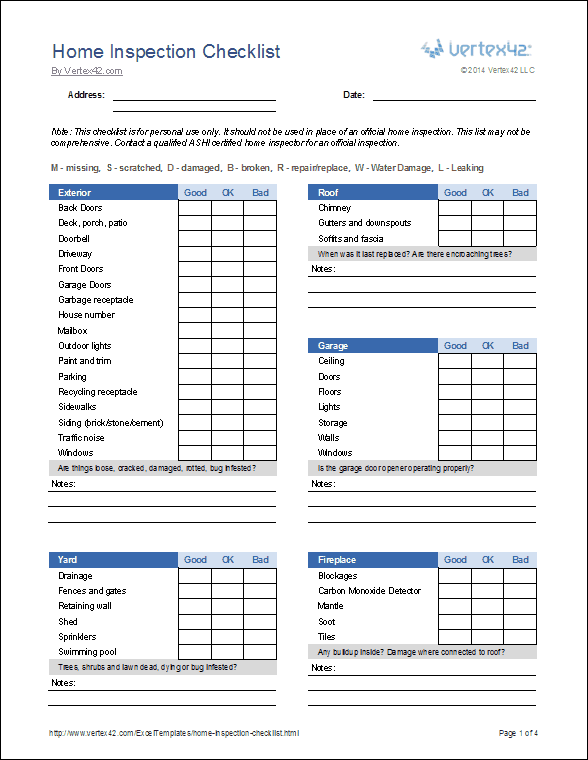Investigations
Due diligence refers to the time period that starts after your offer to purchase is accepted and it ends upon closing. The duration of this period is usually of the due diligence period is typically flexible and the deadline is negotiated between parties.
This is your chance to determine any potential problems with the home that could jeopardize the purchase. Due diligence period also gives you the opportunity to step back from the escrow if certain contingencies do not meet your expectations.
Besides the highly suggested home inspection, which we will cover in a moment, you will also have the chance to explore the neighborhood. I suggest you to drive during the rush hour, explore different streets, check out the crime statistics and talk with the neighbors. This might be the only time they get to freely be noisy and benefit you in the end! Pretend that you wake up in your new house and go on with your day with your routine; drop kids to the school, run errands, drop by for a quick yoga session etc.
However once this period ends, you might lose some of your securities. Usually, if you terminate the purchase agreement after the due diligence period ends, you won’t be able to get back your earnest money unless there is a foul play from the seller’s end such as a serious home defect not disclosed or property title issue.
Seller must disclose property conditions as required by law in most states. These disclosures cover a wide range of structural, mechanical, and other conditions that a prospective buyer should know about in order to make an informed decision.
The law defines a material defect as a problem with the property or any portion of it that would have a significant adverse impact on the value of the residential real property or that involves an unreasonable risk to people on the land. signed and dated disclosure statement must be presented to prospective buyers before they sign an agreement of sale.
In the past, agents tended to accept seller-supplied disclosure forms without question, trusting that all was accurate and complete. Today that trust is risky business.
Sellers are to disclose what they are aware of, and buyers are put on notice to discover hazards about which they are concerned.
The seller must complete the disclosure statement; the listing agent is responsible for advising the seller of this duty and providing an appropriate form for the seller’s use. Agents should caution sellers to make truthful disclosures to avoid litigation arising from fraudulent or careless misrepresentations.
Both the listing agent and the buyer agent should review the disclosure carefully before providing it to a buyer. Any missing or vague information should be clarified before the buyer reviews and signs the seller’s disclosure.
inspections are necessary
Professional home inspectors conduct a thorough visual survey of a property’s structure, systems, and site conditions, and prepare an analytical report that is valuable to both purchasers and homeowners. Increasingly wary consumers are relying on the inspector’s report to help them make purchase decisions. Frequently, an agreement of sale is contingent on the inspector’s report.
During the home inspection your agent will suggest you to be present. This will give you numerous chances such as you will learn if you are getting your money’s worth, inspector will explain all findings which will make more sense in person rather than looking at photos and check-marks in the report afterwards, also you will have the chance to explore your house better and raise any questions. Home inspections usually take longer than appraisals. Expect to reserve 2-3 hours of your time. You will need to pay for home inspection out of pocket and national average is $450.
Please see below a simple version of buyer inspection, you may use this during open houses:

discuss findings, decide go or no go
After receiving your home inspection report, you usually have 2-3 days to read the findings thoroughly. Keep in mind to use your common sense when reading the report as some of the findings are necessary to point (such as blown light-bulbs) but not worthy to be worried or negotiated. Any problem with the structural components or foundation, roof, plumbing system should raise red flags. Once you finish examining the report, it is time to discuss the findings. This step is crucial since your agent will inform you what to ask from seller such as any repairs, replacements etc. According to home inspection insider, the following is few unreasonable repair requests:
- Cosmetic issues
- Renovations you are planning to do anyway
- Nonstructural cracks in drywall – like tape joints
- Repairs to external detached buildings – like sheds
If your inspection report lists defect or safety concerns, the following items are a few examples of things you should request a repair for:
- Electrical systems such as double tapped breakers, faulty breakers, rusted panel boxes, improper wire connections, and defective electrical wiring.
- Plumbing systems such as plumbing leaks in the supply or waste piping, leaky or loose toilets, and inoperative water heater systems
- Cooling systems such as faulty thermostats, damage to ductwork, or inoperative heating or cooling systems.
- Structural defects wood rot to wood framing members, cut or broken framing members, improper or failing support systems.
- Roof systems such as damage to roof coverings, flashings, chimneys, and roof leaks.
- Health/Safety Issues such as asbestos, lead-based paint, mold, moisture intrusion problems in basement or crawl spaces.
Once you decide your situation, it is now to make more negotiations, perhaps amendments in your current purchase contract and negotiate terms with the seller. Most sellers will agree to make necessary repairs within reason however please note that they will not be willing to fix any cosmetic problems in the property. If seller is not willing to do repairs or if the time is tight, your agent will negotiate terms on sales price to accommodate the cost of repairs.
Once the purchase agreement is signed, it will be too late to negotiate on the terms. Please remember upon purchase, any repairs will be under your responsibility, it is the last exit for you to shine your negotiation skills.





